Contract Law: Analyzing Uncle's Promise and Gemstone Misrepresentation
VerifiedAdded on 2022/12/13
|9
|2061
|380
Homework Assignment
AI Summary
This contract law assignment presents two distinct scenarios for analysis. The first involves an uncle's promise of $1,000 to his nephew to abstain from alcohol for 30 days. The assignment examines whether this constitutes an enforceable contract, considering the presence or absence of legal intention, referencing case laws like Jones v Padavatton and Balfour v Balfour. The second scenario explores a gemstone dispute between two members of a gemstone club. It analyzes several situations involving potential misrepresentation, including instances of innocent, negligent, and fraudulent misrepresentation, referencing cases like Bisset v Wilkinson, Smith v Land & House Property Corp, and Derry v Peek. The assignment evaluates the rights and remedies available to the parties involved in each scenario, focusing on the principles of contract law.
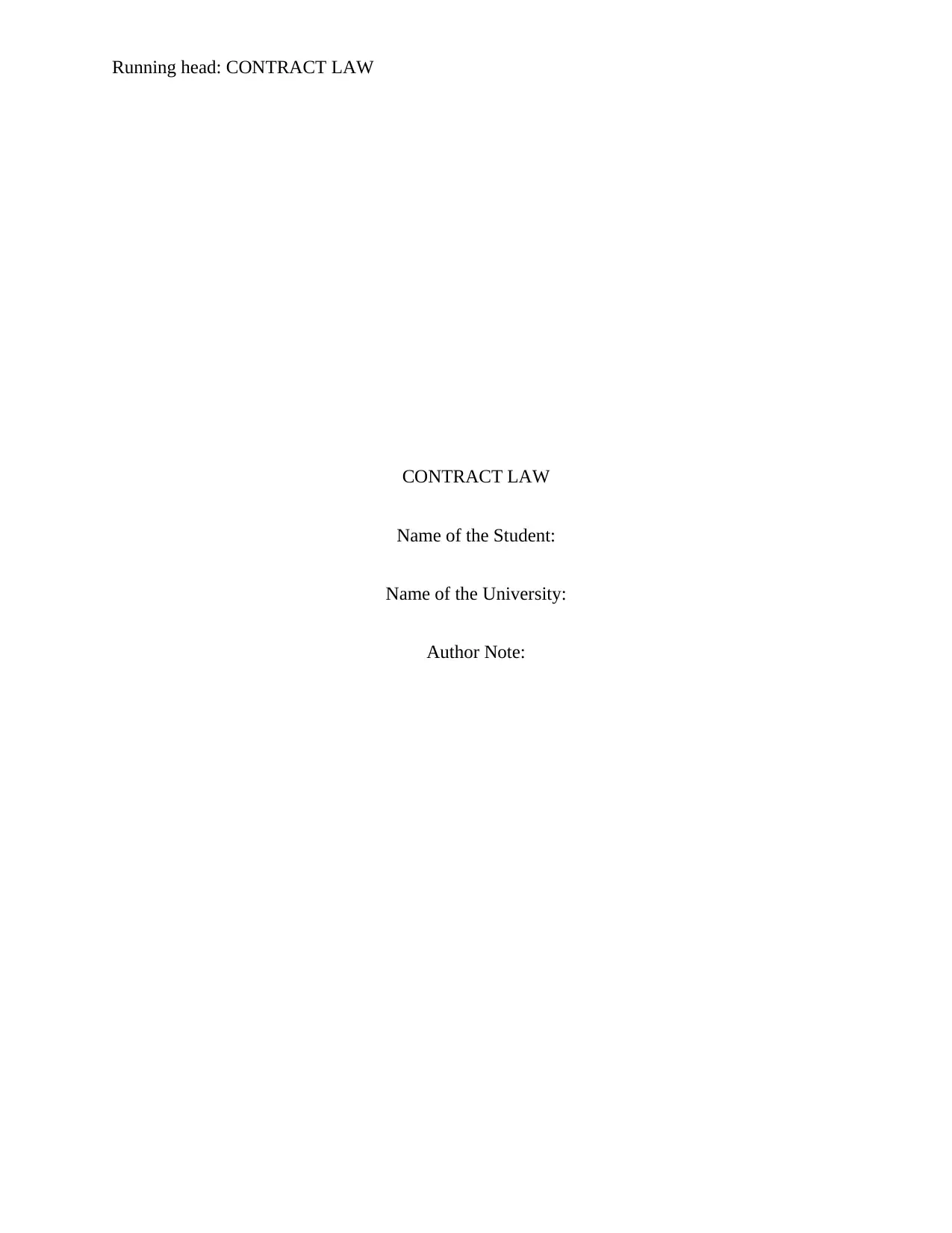
Running head: CONTRACT LAW
CONTRACT LAW
Name of the Student:
Name of the University:
Author Note:
CONTRACT LAW
Name of the Student:
Name of the University:
Author Note:
Paraphrase This Document
Need a fresh take? Get an instant paraphrase of this document with our AI Paraphraser
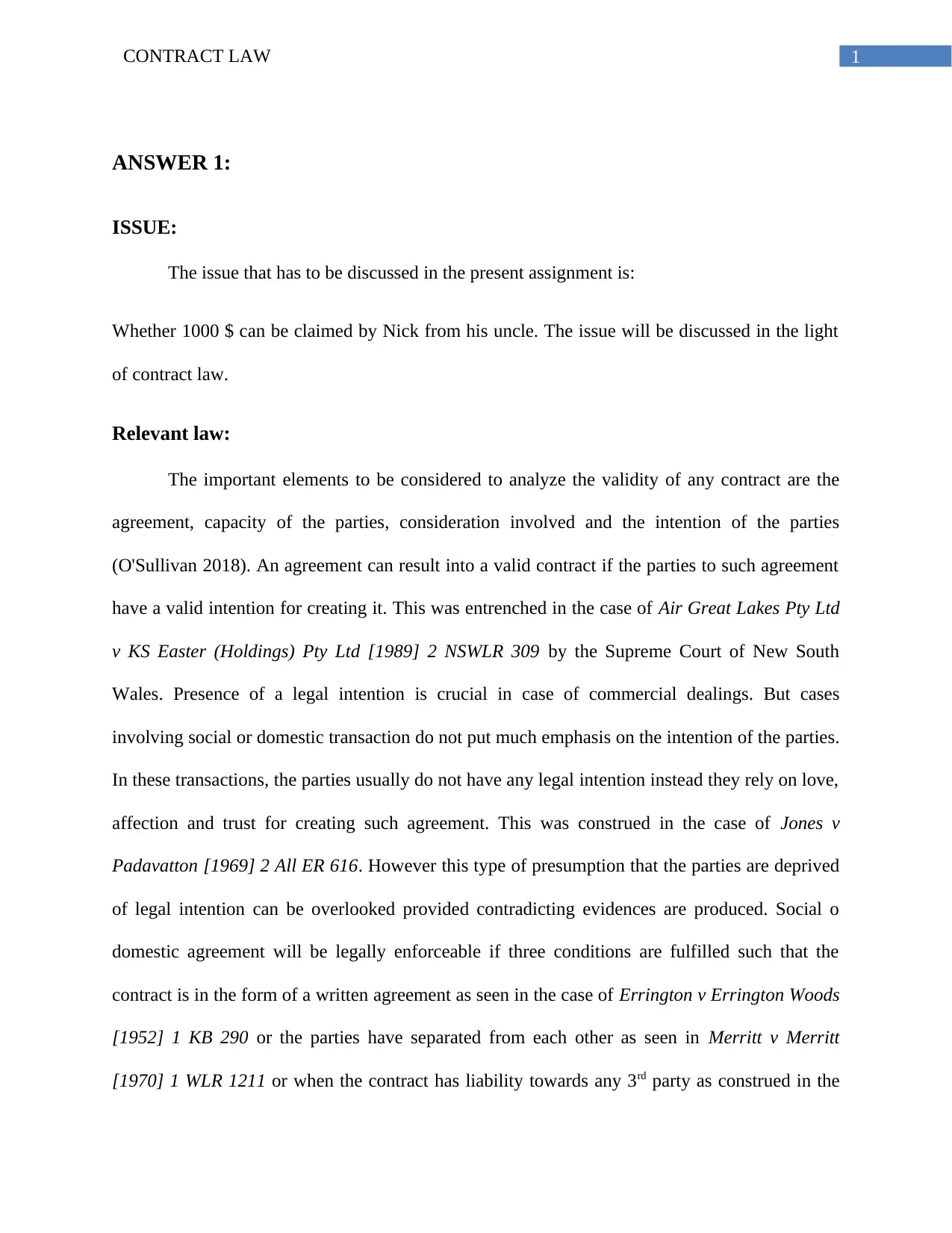
1CONTRACT LAW
ANSWER 1:
ISSUE:
The issue that has to be discussed in the present assignment is:
Whether 1000 $ can be claimed by Nick from his uncle. The issue will be discussed in the light
of contract law.
Relevant law:
The important elements to be considered to analyze the validity of any contract are the
agreement, capacity of the parties, consideration involved and the intention of the parties
(O'Sullivan 2018). An agreement can result into a valid contract if the parties to such agreement
have a valid intention for creating it. This was entrenched in the case of Air Great Lakes Pty Ltd
v KS Easter (Holdings) Pty Ltd [1989] 2 NSWLR 309 by the Supreme Court of New South
Wales. Presence of a legal intention is crucial in case of commercial dealings. But cases
involving social or domestic transaction do not put much emphasis on the intention of the parties.
In these transactions, the parties usually do not have any legal intention instead they rely on love,
affection and trust for creating such agreement. This was construed in the case of Jones v
Padavatton [1969] 2 All ER 616. However this type of presumption that the parties are deprived
of legal intention can be overlooked provided contradicting evidences are produced. Social o
domestic agreement will be legally enforceable if three conditions are fulfilled such that the
contract is in the form of a written agreement as seen in the case of Errington v Errington Woods
[1952] 1 KB 290 or the parties have separated from each other as seen in Merritt v Merritt
[1970] 1 WLR 1211 or when the contract has liability towards any 3rd party as construed in the
ANSWER 1:
ISSUE:
The issue that has to be discussed in the present assignment is:
Whether 1000 $ can be claimed by Nick from his uncle. The issue will be discussed in the light
of contract law.
Relevant law:
The important elements to be considered to analyze the validity of any contract are the
agreement, capacity of the parties, consideration involved and the intention of the parties
(O'Sullivan 2018). An agreement can result into a valid contract if the parties to such agreement
have a valid intention for creating it. This was entrenched in the case of Air Great Lakes Pty Ltd
v KS Easter (Holdings) Pty Ltd [1989] 2 NSWLR 309 by the Supreme Court of New South
Wales. Presence of a legal intention is crucial in case of commercial dealings. But cases
involving social or domestic transaction do not put much emphasis on the intention of the parties.
In these transactions, the parties usually do not have any legal intention instead they rely on love,
affection and trust for creating such agreement. This was construed in the case of Jones v
Padavatton [1969] 2 All ER 616. However this type of presumption that the parties are deprived
of legal intention can be overlooked provided contradicting evidences are produced. Social o
domestic agreement will be legally enforceable if three conditions are fulfilled such that the
contract is in the form of a written agreement as seen in the case of Errington v Errington Woods
[1952] 1 KB 290 or the parties have separated from each other as seen in Merritt v Merritt
[1970] 1 WLR 1211 or when the contract has liability towards any 3rd party as construed in the
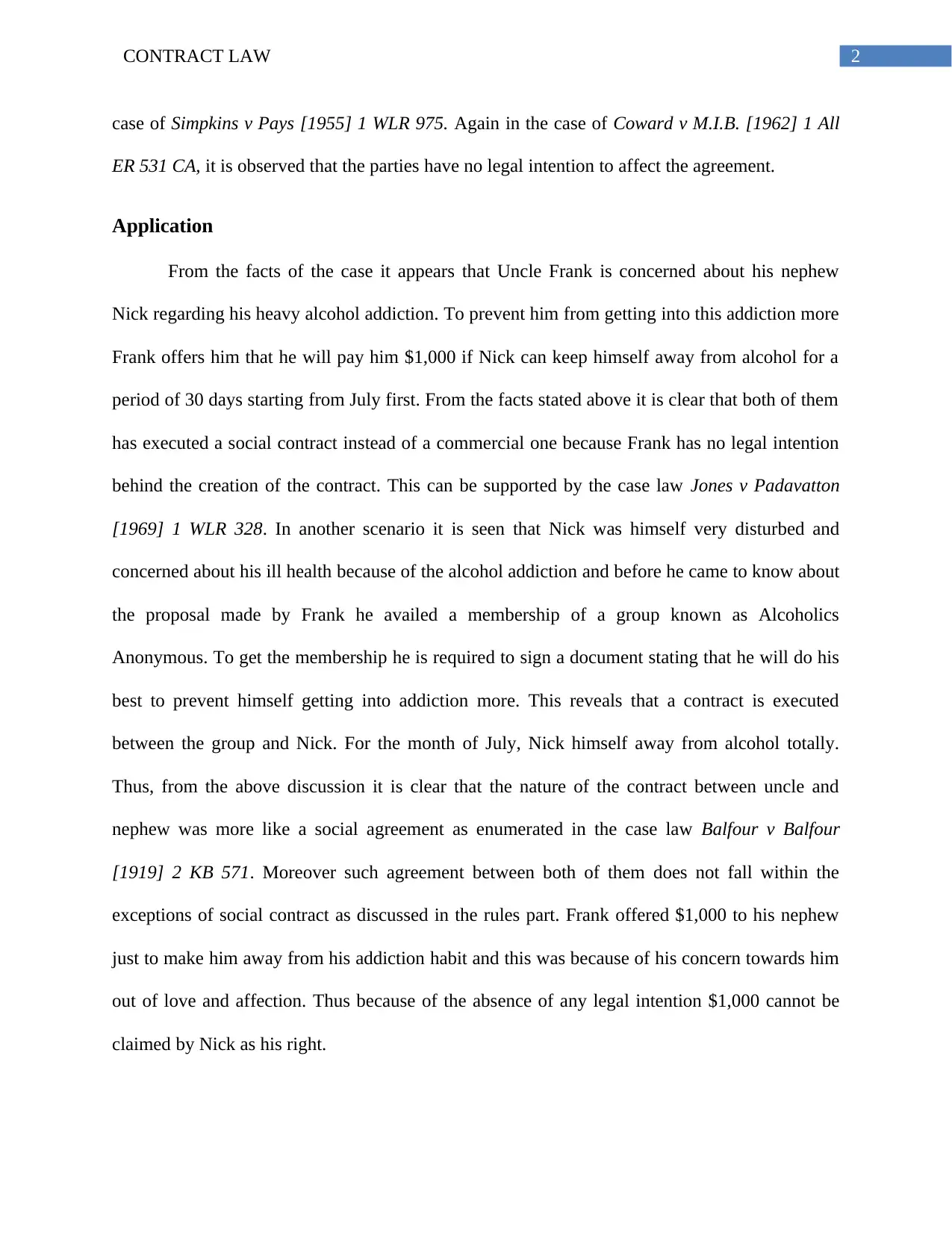
2CONTRACT LAW
case of Simpkins v Pays [1955] 1 WLR 975. Again in the case of Coward v M.I.B. [1962] 1 All
ER 531 CA, it is observed that the parties have no legal intention to affect the agreement.
Application
From the facts of the case it appears that Uncle Frank is concerned about his nephew
Nick regarding his heavy alcohol addiction. To prevent him from getting into this addiction more
Frank offers him that he will pay him $1,000 if Nick can keep himself away from alcohol for a
period of 30 days starting from July first. From the facts stated above it is clear that both of them
has executed a social contract instead of a commercial one because Frank has no legal intention
behind the creation of the contract. This can be supported by the case law Jones v Padavatton
[1969] 1 WLR 328. In another scenario it is seen that Nick was himself very disturbed and
concerned about his ill health because of the alcohol addiction and before he came to know about
the proposal made by Frank he availed a membership of a group known as Alcoholics
Anonymous. To get the membership he is required to sign a document stating that he will do his
best to prevent himself getting into addiction more. This reveals that a contract is executed
between the group and Nick. For the month of July, Nick himself away from alcohol totally.
Thus, from the above discussion it is clear that the nature of the contract between uncle and
nephew was more like a social agreement as enumerated in the case law Balfour v Balfour
[1919] 2 KB 571. Moreover such agreement between both of them does not fall within the
exceptions of social contract as discussed in the rules part. Frank offered $1,000 to his nephew
just to make him away from his addiction habit and this was because of his concern towards him
out of love and affection. Thus because of the absence of any legal intention $1,000 cannot be
claimed by Nick as his right.
case of Simpkins v Pays [1955] 1 WLR 975. Again in the case of Coward v M.I.B. [1962] 1 All
ER 531 CA, it is observed that the parties have no legal intention to affect the agreement.
Application
From the facts of the case it appears that Uncle Frank is concerned about his nephew
Nick regarding his heavy alcohol addiction. To prevent him from getting into this addiction more
Frank offers him that he will pay him $1,000 if Nick can keep himself away from alcohol for a
period of 30 days starting from July first. From the facts stated above it is clear that both of them
has executed a social contract instead of a commercial one because Frank has no legal intention
behind the creation of the contract. This can be supported by the case law Jones v Padavatton
[1969] 1 WLR 328. In another scenario it is seen that Nick was himself very disturbed and
concerned about his ill health because of the alcohol addiction and before he came to know about
the proposal made by Frank he availed a membership of a group known as Alcoholics
Anonymous. To get the membership he is required to sign a document stating that he will do his
best to prevent himself getting into addiction more. This reveals that a contract is executed
between the group and Nick. For the month of July, Nick himself away from alcohol totally.
Thus, from the above discussion it is clear that the nature of the contract between uncle and
nephew was more like a social agreement as enumerated in the case law Balfour v Balfour
[1919] 2 KB 571. Moreover such agreement between both of them does not fall within the
exceptions of social contract as discussed in the rules part. Frank offered $1,000 to his nephew
just to make him away from his addiction habit and this was because of his concern towards him
out of love and affection. Thus because of the absence of any legal intention $1,000 cannot be
claimed by Nick as his right.
⊘ This is a preview!⊘
Do you want full access?
Subscribe today to unlock all pages.

Trusted by 1+ million students worldwide
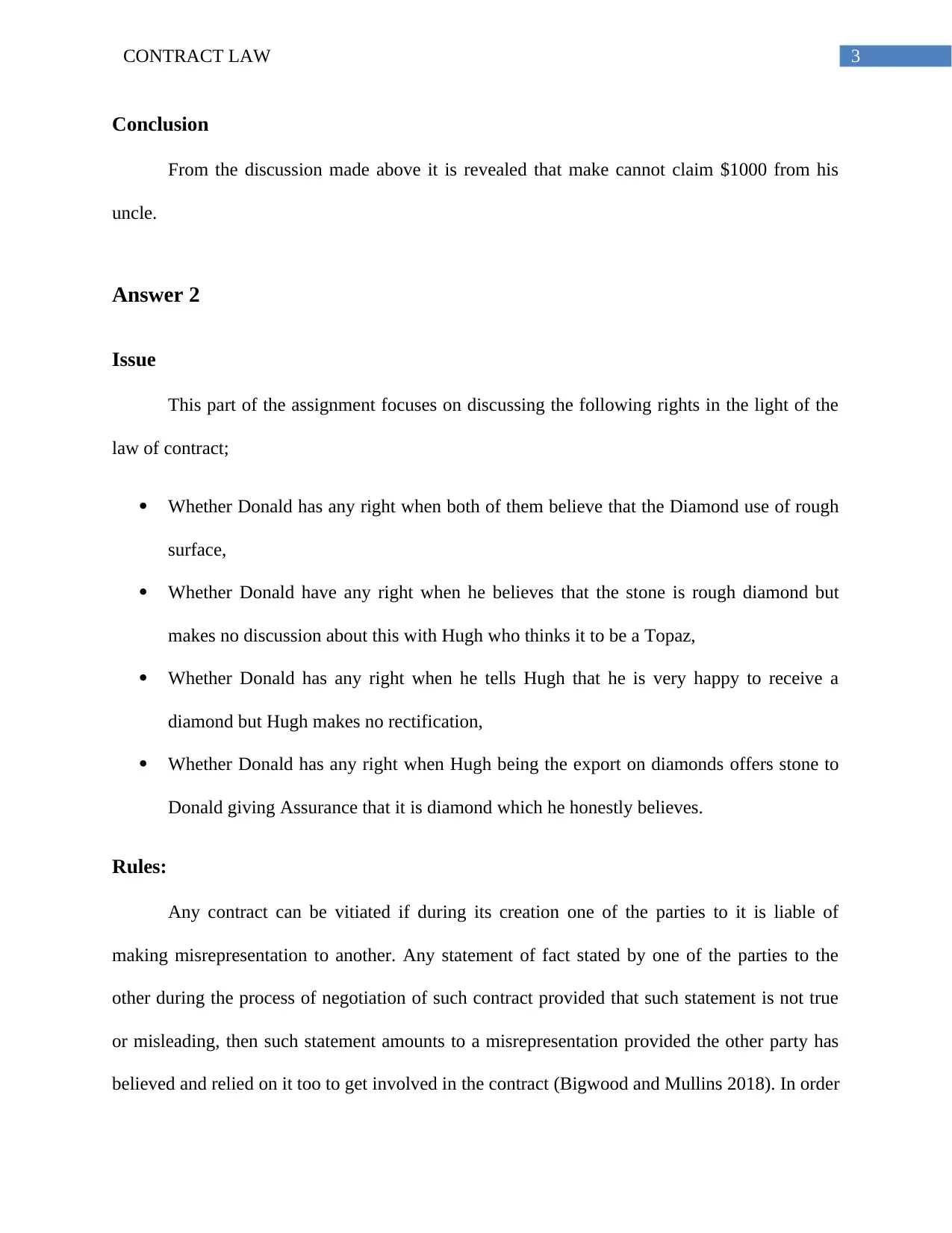
3CONTRACT LAW
Conclusion
From the discussion made above it is revealed that make cannot claim $1000 from his
uncle.
Answer 2
Issue
This part of the assignment focuses on discussing the following rights in the light of the
law of contract;
Whether Donald has any right when both of them believe that the Diamond use of rough
surface,
Whether Donald have any right when he believes that the stone is rough diamond but
makes no discussion about this with Hugh who thinks it to be a Topaz,
Whether Donald has any right when he tells Hugh that he is very happy to receive a
diamond but Hugh makes no rectification,
Whether Donald has any right when Hugh being the export on diamonds offers stone to
Donald giving Assurance that it is diamond which he honestly believes.
Rules:
Any contract can be vitiated if during its creation one of the parties to it is liable of
making misrepresentation to another. Any statement of fact stated by one of the parties to the
other during the process of negotiation of such contract provided that such statement is not true
or misleading, then such statement amounts to a misrepresentation provided the other party has
believed and relied on it too to get involved in the contract (Bigwood and Mullins 2018). In order
Conclusion
From the discussion made above it is revealed that make cannot claim $1000 from his
uncle.
Answer 2
Issue
This part of the assignment focuses on discussing the following rights in the light of the
law of contract;
Whether Donald has any right when both of them believe that the Diamond use of rough
surface,
Whether Donald have any right when he believes that the stone is rough diamond but
makes no discussion about this with Hugh who thinks it to be a Topaz,
Whether Donald has any right when he tells Hugh that he is very happy to receive a
diamond but Hugh makes no rectification,
Whether Donald has any right when Hugh being the export on diamonds offers stone to
Donald giving Assurance that it is diamond which he honestly believes.
Rules:
Any contract can be vitiated if during its creation one of the parties to it is liable of
making misrepresentation to another. Any statement of fact stated by one of the parties to the
other during the process of negotiation of such contract provided that such statement is not true
or misleading, then such statement amounts to a misrepresentation provided the other party has
believed and relied on it too to get involved in the contract (Bigwood and Mullins 2018). In order
Paraphrase This Document
Need a fresh take? Get an instant paraphrase of this document with our AI Paraphraser
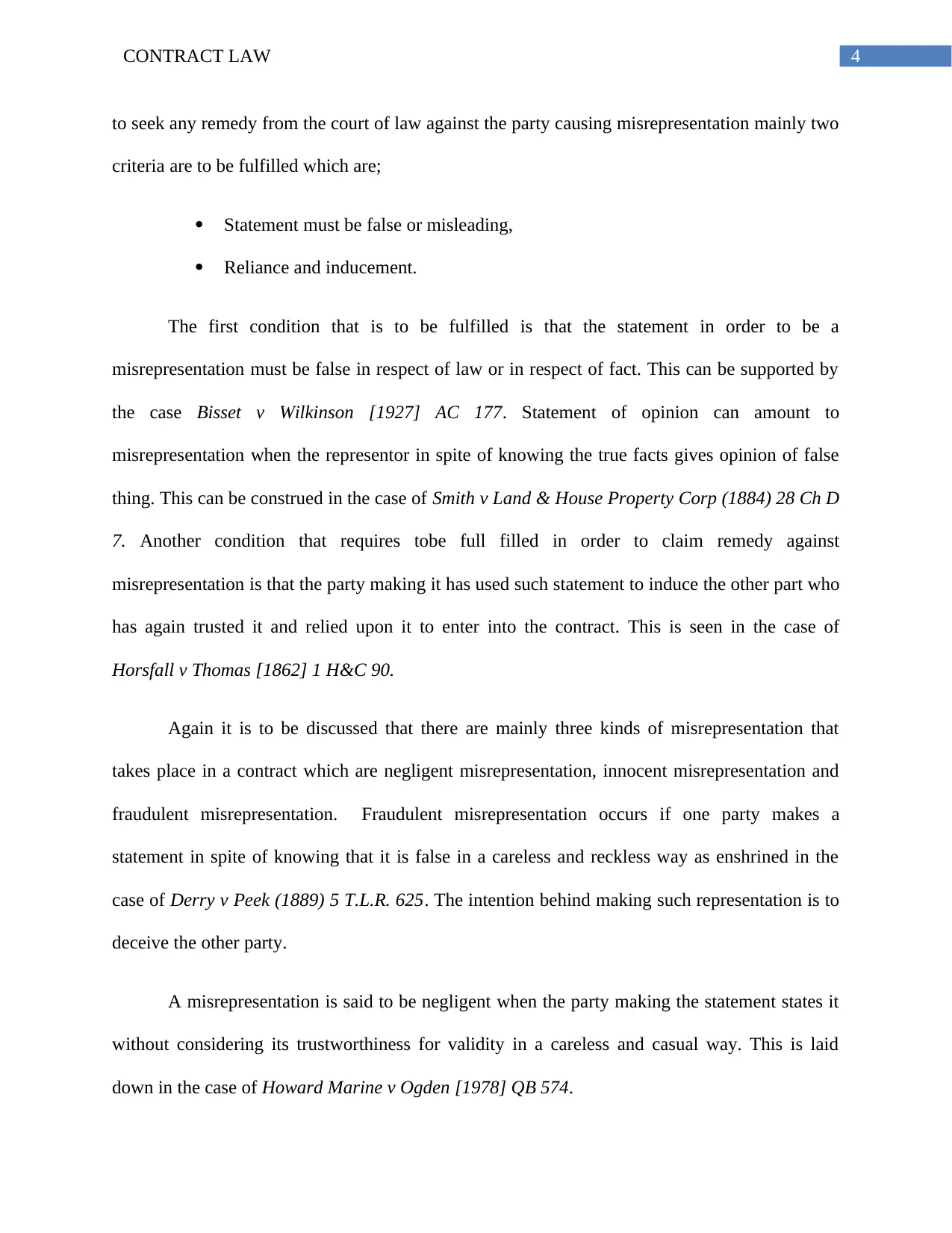
4CONTRACT LAW
to seek any remedy from the court of law against the party causing misrepresentation mainly two
criteria are to be fulfilled which are;
Statement must be false or misleading,
Reliance and inducement.
The first condition that is to be fulfilled is that the statement in order to be a
misrepresentation must be false in respect of law or in respect of fact. This can be supported by
the case Bisset v Wilkinson [1927] AC 177. Statement of opinion can amount to
misrepresentation when the representor in spite of knowing the true facts gives opinion of false
thing. This can be construed in the case of Smith v Land & House Property Corp (1884) 28 Ch D
7. Another condition that requires tobe full filled in order to claim remedy against
misrepresentation is that the party making it has used such statement to induce the other part who
has again trusted it and relied upon it to enter into the contract. This is seen in the case of
Horsfall v Thomas [1862] 1 H&C 90.
Again it is to be discussed that there are mainly three kinds of misrepresentation that
takes place in a contract which are negligent misrepresentation, innocent misrepresentation and
fraudulent misrepresentation. Fraudulent misrepresentation occurs if one party makes a
statement in spite of knowing that it is false in a careless and reckless way as enshrined in the
case of Derry v Peek (1889) 5 T.L.R. 625. The intention behind making such representation is to
deceive the other party.
A misrepresentation is said to be negligent when the party making the statement states it
without considering its trustworthiness for validity in a careless and casual way. This is laid
down in the case of Howard Marine v Ogden [1978] QB 574.
to seek any remedy from the court of law against the party causing misrepresentation mainly two
criteria are to be fulfilled which are;
Statement must be false or misleading,
Reliance and inducement.
The first condition that is to be fulfilled is that the statement in order to be a
misrepresentation must be false in respect of law or in respect of fact. This can be supported by
the case Bisset v Wilkinson [1927] AC 177. Statement of opinion can amount to
misrepresentation when the representor in spite of knowing the true facts gives opinion of false
thing. This can be construed in the case of Smith v Land & House Property Corp (1884) 28 Ch D
7. Another condition that requires tobe full filled in order to claim remedy against
misrepresentation is that the party making it has used such statement to induce the other part who
has again trusted it and relied upon it to enter into the contract. This is seen in the case of
Horsfall v Thomas [1862] 1 H&C 90.
Again it is to be discussed that there are mainly three kinds of misrepresentation that
takes place in a contract which are negligent misrepresentation, innocent misrepresentation and
fraudulent misrepresentation. Fraudulent misrepresentation occurs if one party makes a
statement in spite of knowing that it is false in a careless and reckless way as enshrined in the
case of Derry v Peek (1889) 5 T.L.R. 625. The intention behind making such representation is to
deceive the other party.
A misrepresentation is said to be negligent when the party making the statement states it
without considering its trustworthiness for validity in a careless and casual way. This is laid
down in the case of Howard Marine v Ogden [1978] QB 574.
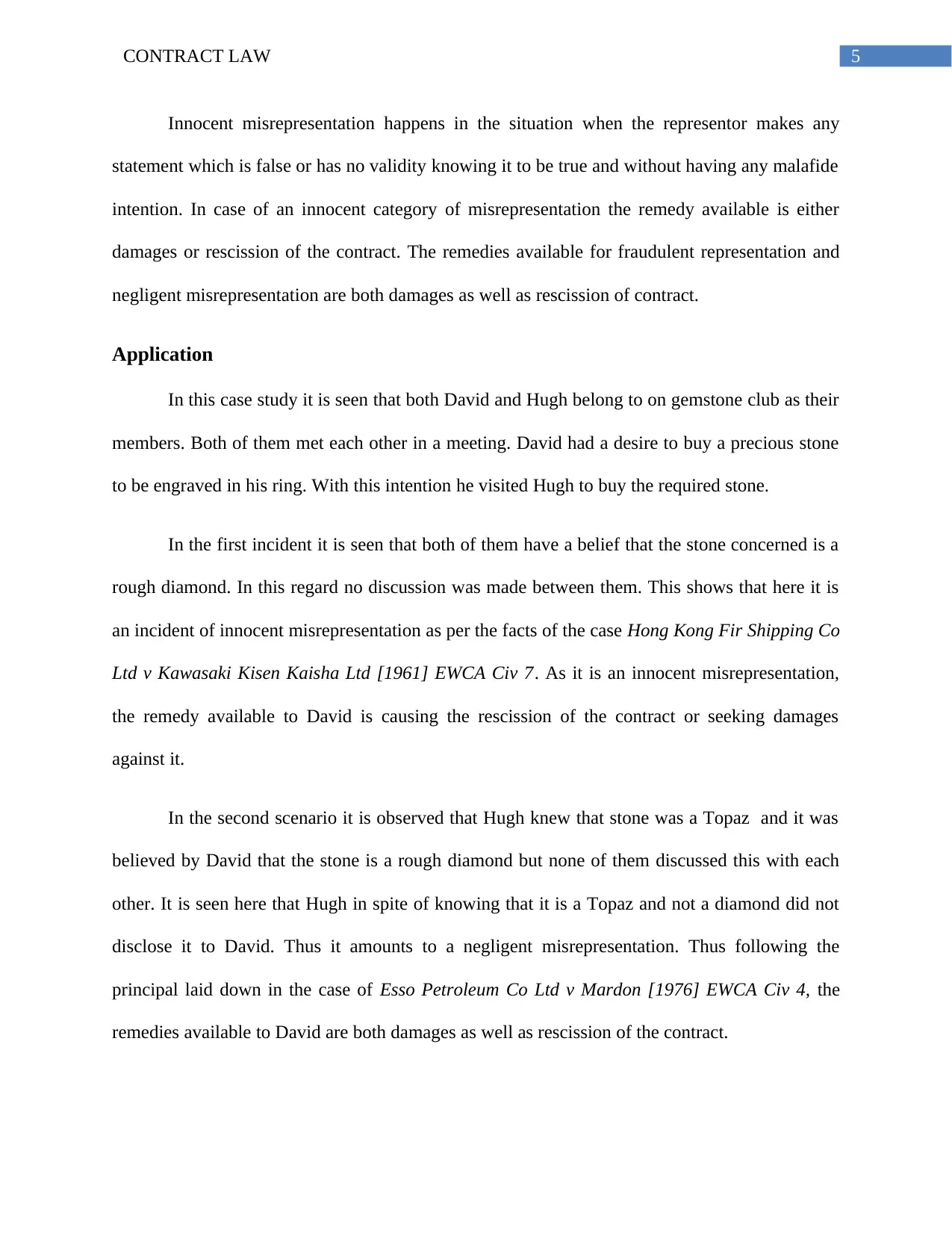
5CONTRACT LAW
Innocent misrepresentation happens in the situation when the representor makes any
statement which is false or has no validity knowing it to be true and without having any malafide
intention. In case of an innocent category of misrepresentation the remedy available is either
damages or rescission of the contract. The remedies available for fraudulent representation and
negligent misrepresentation are both damages as well as rescission of contract.
Application
In this case study it is seen that both David and Hugh belong to on gemstone club as their
members. Both of them met each other in a meeting. David had a desire to buy a precious stone
to be engraved in his ring. With this intention he visited Hugh to buy the required stone.
In the first incident it is seen that both of them have a belief that the stone concerned is a
rough diamond. In this regard no discussion was made between them. This shows that here it is
an incident of innocent misrepresentation as per the facts of the case Hong Kong Fir Shipping Co
Ltd v Kawasaki Kisen Kaisha Ltd [1961] EWCA Civ 7. As it is an innocent misrepresentation,
the remedy available to David is causing the rescission of the contract or seeking damages
against it.
In the second scenario it is observed that Hugh knew that stone was a Topaz and it was
believed by David that the stone is a rough diamond but none of them discussed this with each
other. It is seen here that Hugh in spite of knowing that it is a Topaz and not a diamond did not
disclose it to David. Thus it amounts to a negligent misrepresentation. Thus following the
principal laid down in the case of Esso Petroleum Co Ltd v Mardon [1976] EWCA Civ 4, the
remedies available to David are both damages as well as rescission of the contract.
Innocent misrepresentation happens in the situation when the representor makes any
statement which is false or has no validity knowing it to be true and without having any malafide
intention. In case of an innocent category of misrepresentation the remedy available is either
damages or rescission of the contract. The remedies available for fraudulent representation and
negligent misrepresentation are both damages as well as rescission of contract.
Application
In this case study it is seen that both David and Hugh belong to on gemstone club as their
members. Both of them met each other in a meeting. David had a desire to buy a precious stone
to be engraved in his ring. With this intention he visited Hugh to buy the required stone.
In the first incident it is seen that both of them have a belief that the stone concerned is a
rough diamond. In this regard no discussion was made between them. This shows that here it is
an incident of innocent misrepresentation as per the facts of the case Hong Kong Fir Shipping Co
Ltd v Kawasaki Kisen Kaisha Ltd [1961] EWCA Civ 7. As it is an innocent misrepresentation,
the remedy available to David is causing the rescission of the contract or seeking damages
against it.
In the second scenario it is observed that Hugh knew that stone was a Topaz and it was
believed by David that the stone is a rough diamond but none of them discussed this with each
other. It is seen here that Hugh in spite of knowing that it is a Topaz and not a diamond did not
disclose it to David. Thus it amounts to a negligent misrepresentation. Thus following the
principal laid down in the case of Esso Petroleum Co Ltd v Mardon [1976] EWCA Civ 4, the
remedies available to David are both damages as well as rescission of the contract.
⊘ This is a preview!⊘
Do you want full access?
Subscribe today to unlock all pages.

Trusted by 1+ million students worldwide
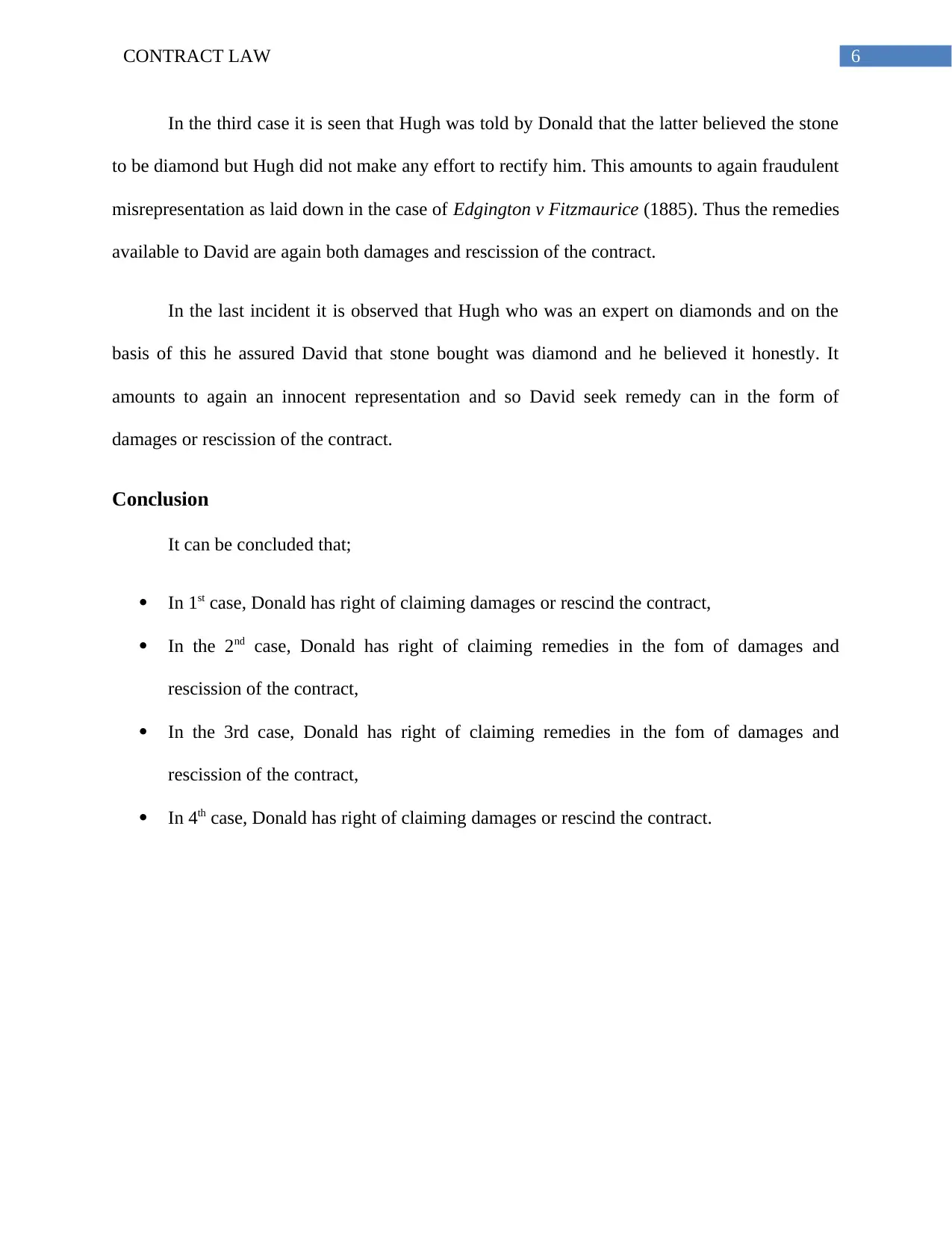
6CONTRACT LAW
In the third case it is seen that Hugh was told by Donald that the latter believed the stone
to be diamond but Hugh did not make any effort to rectify him. This amounts to again fraudulent
misrepresentation as laid down in the case of Edgington v Fitzmaurice (1885). Thus the remedies
available to David are again both damages and rescission of the contract.
In the last incident it is observed that Hugh who was an expert on diamonds and on the
basis of this he assured David that stone bought was diamond and he believed it honestly. It
amounts to again an innocent representation and so David seek remedy can in the form of
damages or rescission of the contract.
Conclusion
It can be concluded that;
In 1st case, Donald has right of claiming damages or rescind the contract,
In the 2nd case, Donald has right of claiming remedies in the fom of damages and
rescission of the contract,
In the 3rd case, Donald has right of claiming remedies in the fom of damages and
rescission of the contract,
In 4th case, Donald has right of claiming damages or rescind the contract.
In the third case it is seen that Hugh was told by Donald that the latter believed the stone
to be diamond but Hugh did not make any effort to rectify him. This amounts to again fraudulent
misrepresentation as laid down in the case of Edgington v Fitzmaurice (1885). Thus the remedies
available to David are again both damages and rescission of the contract.
In the last incident it is observed that Hugh who was an expert on diamonds and on the
basis of this he assured David that stone bought was diamond and he believed it honestly. It
amounts to again an innocent representation and so David seek remedy can in the form of
damages or rescission of the contract.
Conclusion
It can be concluded that;
In 1st case, Donald has right of claiming damages or rescind the contract,
In the 2nd case, Donald has right of claiming remedies in the fom of damages and
rescission of the contract,
In the 3rd case, Donald has right of claiming remedies in the fom of damages and
rescission of the contract,
In 4th case, Donald has right of claiming damages or rescind the contract.
Paraphrase This Document
Need a fresh take? Get an instant paraphrase of this document with our AI Paraphraser
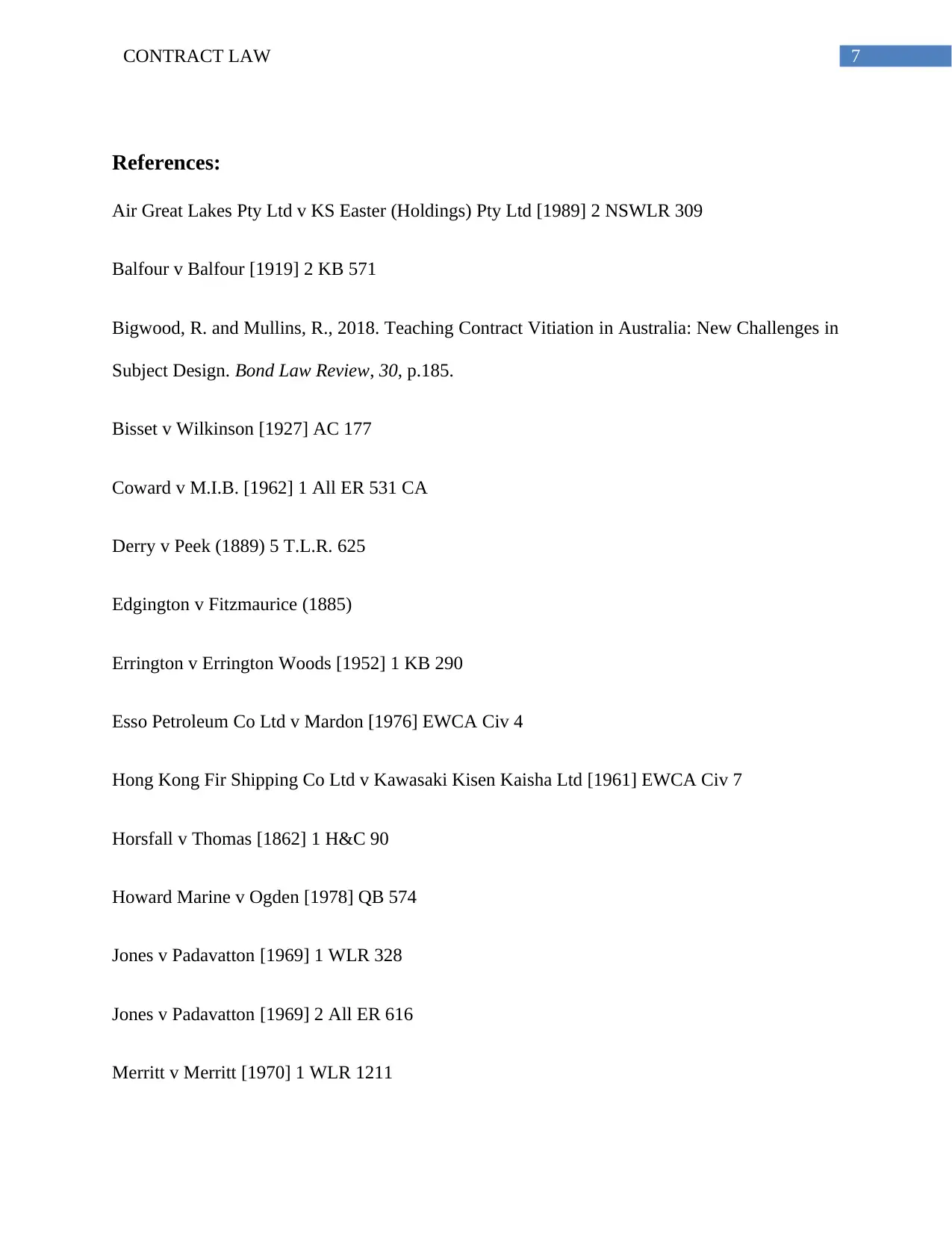
7CONTRACT LAW
References:
Air Great Lakes Pty Ltd v KS Easter (Holdings) Pty Ltd [1989] 2 NSWLR 309
Balfour v Balfour [1919] 2 KB 571
Bigwood, R. and Mullins, R., 2018. Teaching Contract Vitiation in Australia: New Challenges in
Subject Design. Bond Law Review, 30, p.185.
Bisset v Wilkinson [1927] AC 177
Coward v M.I.B. [1962] 1 All ER 531 CA
Derry v Peek (1889) 5 T.L.R. 625
Edgington v Fitzmaurice (1885)
Errington v Errington Woods [1952] 1 KB 290
Esso Petroleum Co Ltd v Mardon [1976] EWCA Civ 4
Hong Kong Fir Shipping Co Ltd v Kawasaki Kisen Kaisha Ltd [1961] EWCA Civ 7
Horsfall v Thomas [1862] 1 H&C 90
Howard Marine v Ogden [1978] QB 574
Jones v Padavatton [1969] 1 WLR 328
Jones v Padavatton [1969] 2 All ER 616
Merritt v Merritt [1970] 1 WLR 1211
References:
Air Great Lakes Pty Ltd v KS Easter (Holdings) Pty Ltd [1989] 2 NSWLR 309
Balfour v Balfour [1919] 2 KB 571
Bigwood, R. and Mullins, R., 2018. Teaching Contract Vitiation in Australia: New Challenges in
Subject Design. Bond Law Review, 30, p.185.
Bisset v Wilkinson [1927] AC 177
Coward v M.I.B. [1962] 1 All ER 531 CA
Derry v Peek (1889) 5 T.L.R. 625
Edgington v Fitzmaurice (1885)
Errington v Errington Woods [1952] 1 KB 290
Esso Petroleum Co Ltd v Mardon [1976] EWCA Civ 4
Hong Kong Fir Shipping Co Ltd v Kawasaki Kisen Kaisha Ltd [1961] EWCA Civ 7
Horsfall v Thomas [1862] 1 H&C 90
Howard Marine v Ogden [1978] QB 574
Jones v Padavatton [1969] 1 WLR 328
Jones v Padavatton [1969] 2 All ER 616
Merritt v Merritt [1970] 1 WLR 1211

8CONTRACT LAW
O'Sullivan, J., 2018. O'Sullivan and Hilliard's the Law of Contract. Oxford University Press.
Simpkins v Pays [1955] 1 WLR 975
Smith v Land & House Property Corp (1884) 28 Ch D 7
O'Sullivan, J., 2018. O'Sullivan and Hilliard's the Law of Contract. Oxford University Press.
Simpkins v Pays [1955] 1 WLR 975
Smith v Land & House Property Corp (1884) 28 Ch D 7
⊘ This is a preview!⊘
Do you want full access?
Subscribe today to unlock all pages.

Trusted by 1+ million students worldwide
1 out of 9
Related Documents
Your All-in-One AI-Powered Toolkit for Academic Success.
+13062052269
info@desklib.com
Available 24*7 on WhatsApp / Email
![[object Object]](/_next/static/media/star-bottom.7253800d.svg)
Unlock your academic potential
Copyright © 2020–2026 A2Z Services. All Rights Reserved. Developed and managed by ZUCOL.





